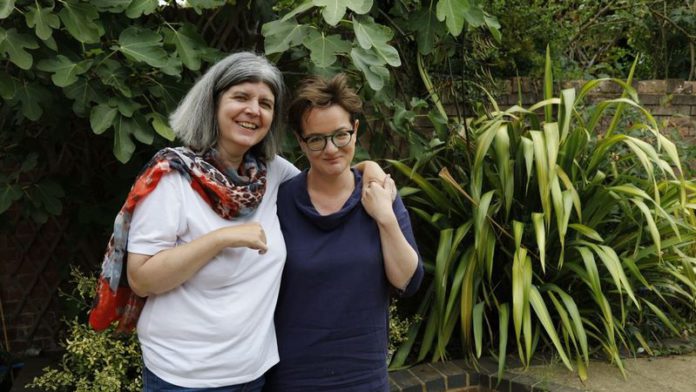What’s your name?” asked the nurse. “Anna,” said Anna.
“And who is this?” The nurse pointed at me. “Nancy,” my partner said, with warmth in her voice.
“Where are you?” asked the nurse. “In the pub,” replied Anna.
She wasn’t. It was October 2019 and Anna was being treated for a stroke. Had she been home alone when it happened, it is unlikely she would have survived. As it was, she was at her office on the phone to a client when her words began to slur. She was only 46 at the time so no one guessed what was happening, but fortunately they called 999 for help.
The sooner a person receives treatment for stroke, the less damage is likely. Anna’s life was saved by a relatively new procedure known as mechanical thrombectomy, which sends a catheter through the blood vessels to siphon clots from the brain.
It was just the first step on a long road to recovery.
As rumours of a virus in Wuhan, China, circled the world, I spent hours in the Acute Stroke Unit of Oxford’s John Radcliffe Hospital watching as Anna slept, surrounded by a daunting array of medical equipment.
Handed a piece of paper covered in stars, Anna was instructed to draw circles around them. Since her right arm was paralysed, she took the pen in her left and scribbled them all out.
“Let’s try again,” said the nurse kindly, as if it didn’t matter. Anna struck through the stars furiously, as if wishing to obliterate a galaxy.
When I left the ward, the nurse followed. “Anna has very severe aphasia,” she said, explaining that damage to the left side of the brain caused difficulty with language.
Those with the disorder may make mistakes with words or struggle to find them, although it doesn’t affect their intelligence.
For months, Anna found it hard to summon any words at all. Someone who had told me of the thrills of working as an interpreter now seemed to be digging deep within herself to excavate a language no one else knew.
It was agonising to see her distress and not be able to discuss the huge event that had crashed in on our lives.
“Ask me tomorrow,” she would say whenever she found something inexpressible. Ask me tomorrow.
When Anna moved to a rehab facility in early December 2019, we had a heartbreaking discussion about the future, deciding to separate.
It had felt for some time before the stroke that our lives were going in different directions.
Anna asked me to live with her for a year after she left rehab, not as her partner but as her primary carer. “I can’t do this without you,” she said.
So I moved back to our rented basement flat in Oxford, with Anna being discharged a few days before the first lockdown.
The pandemic cancelled outpatient services, and support workers weren’t permitted to visit. Having been surrounded by experts for months, we were suddenly alone.
Those first weeks were terrifying. It was hard to see someone so independent needing help with daily tasks.
Caring can be a lonely occupation at the best of times and, unaware of the support offered by organisations like Carers UK, I suffered in silence.
I was in shock and drifted through the days – missing work deadlines, failing to answer emails, preoccupied by new questions.
Can a paralysed limb feel pain? Where did those big bruises keep coming from? The changes to Anna’s body were apparent, but what went through her mind?
As the months passed Anna’s words began to return, although some days they vanished again.
An NHS brochure gave communication advice that could have been designed for any relationship: be patient, don’t finish their sentences for them, listen. Besides, there are other forms of expression than speech.
After almost a decade together, often I understood where Anna’s thoughts were heading.
She has always been a brilliant home cook, but now needed to rebuild these skills left-handed.
In craft sessions at the rehab unit she had made a wooden chopping board, a terrifying spike in one corner to hold veg in place. She had hero-worshipped debonair food writer Michael Ruhlman, but now turned to Michelin-starred Michael Caines, who lost his right hand in a car accident.
There were low points. Anna smashed every glass we owned, put pizzas in the oven still on polystyrene bases – but her motivation did not fail.
She started an Instagram account ( @PostStrokeChef ) to chart her kitchen adventures. From the first brave, soggy offerings of fish fingers and peas, it now records delicious soups, stews and cakes.
During the pandemic, people spoke of things never returning to the way they were. Likewise, those who experience life-changing events often say they discover a “new normal”.
Anna’s passion had been reading, but since her stroke she has given away all her books.
New enthusiasms have taken the place of old ones. A highlight of her week now is cycling with the charity Wheels for All on a quiet athletics track near home.
When the year of caring had passed I moved to a caravan in the woods outside Oxford. Financial challenges had added to other anxieties, but a caravan was an affordable solution to housing insecurity.
Being surrounded by nature helped me recover emotional balance and repairing the old vehicle gave me a sense of independence.
Anna looked on my new project with amusement and told me that I was always welcome to visit her and bring laundry.
I do visit, and not just with laundry – but because after all we’ve been through together she’s my best friend.
Nancy Campbell’s memoir Thunderstone: A True Story Of Losing One Home And Discovering Another (Elliott & Thompson) is published on Thursday


